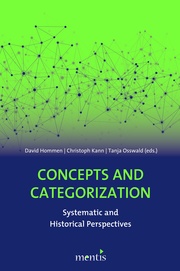Detailansicht
Concepts and Categorization
Systematic and Historical Perspectives
ISBN/EAN: 9783897850743
Umbreit-Nr.: 8801471
Sprache:
Deutsch
Umfang: 227 S.
Format in cm: 1.5 x 23.3 x 15.3
Einband:
kartoniertes Buch
Erschienen am 22.03.2016
Auflage: 1/2016
- Zusatztext
- The study of concepts lies at the intersection of various disciplines, both analytic and empiric. The rising cognitive sciences, for instance, are interested in concepts insofar as they are used in an explanation of such diverse epistemic phenomena like categorization, inference, memory, learning, and decision-making. In philosophy, the challenge imposed by conceptualization consists, among other things, in accommodating reverse intuitions about concepts like shareability, mind-dependency, mediation between reference, knowledge and reality, etc. While researchers have collaborated more and more to contribute to a unified understanding of concepts and categorization, the joint venture unfortunately suffers (so far) from the fact that it is generally left unclear how exactly the different approaches undertaken in the participating sciences relate to each other. What do psychologists and philosophers mean by the notion of a concept? Is there a core-theory of concepts and categorization underlying analytical and empirical studies? The present collection of essays addresses these and related questions and tries to answer them from both a systematic and a historical perspective.
- Autorenportrait
- David Hommen, geb. 1980, Studium der Philosophie, Kommunikations- und Medienwissenschaft und Musikwissenschaft an der Universität Düsseldorf. 2007 Magister Artium, 2012 Promotion im Fach Philosophie. Seit 2009 wissenschaftlicher Mitarbeiter und Dozent an der Universität Düsseldorf. Studies in philosophy, media studies and musicology. Doctoral degree in philosophy (Düsseldorf). Postdoc research fellow in the DFG Collaborative Research Centre 'The Structure of Representations in Language, Cognition, and Science'. Forschungsschwerpunkte: Philosophie des Geistes, Theorien der Kausalität, Ontologie der Unterlassung Christoph Kann, Studies in philosophy and classical philology (Düsseldorf, Freiburg i.Br., Cologne), doctoral degree in philosophy (Cologne), habilitation at the University of Paderborn, Professor of philosophy at the University of Düsseldorf. Tanja Osswald, Diplom in mathematics (Bonn), MSc in Logic (Amsterdam). Worked in mathematics, philosophy and linguistics, lately as a researcher in the DFG Collaborative Research Centre 'The Structure of Representations in Language, Cognition, and Science.'
